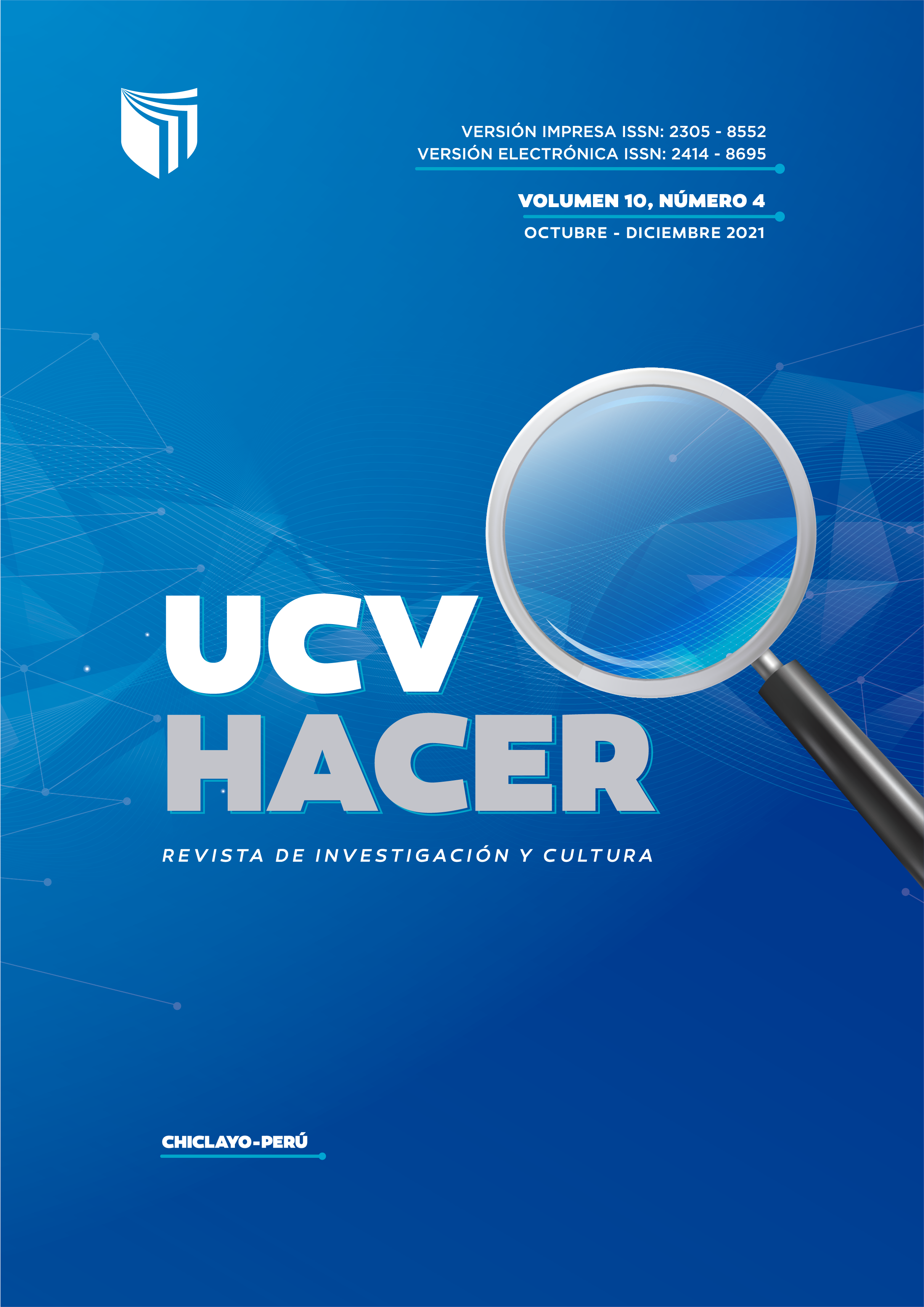Pedagogical model based in social abilities for the development of the critical and creative thinking in university students
DOI:
https://doi.org/10.18050/RevUCVHACER.v10n4a8Keywords:
Modelo pedagógico, Habilidades sociales, Pensamiento crítico, Pensamiento creativoAbstract
This research had like the main objective to design a pedagogical model based in social abilities for the development of the critical and creative thinking of the students from the 2nd cycle in a private university. To obtain that, it was necessary to adopt basic research, and a mixed research approach. It was employed the survey technique, and it was employed like a tool the questionnaire about the critical and creative thinking and social abilities that was directed to the student’s participants in the research and another questionnaire applied to the professors in relation with the same study variables. It was employed the
interview technique which was applied just to the professors of the students. After the application of the tools the students were located in the three levels of the critical and creative thinking: high, medium and low, and in the medium level most of the students were placed, according to the development of the critical and creative thinking. Finally, it is concluded that the pedagogical model in social abilities is a necessary pedagogical tool that makes better the development of the critical and creative thinking.
Keywords: Pedagogical model, social abilities, critical and creative thinking.
References
Andersson, L. (07 de diciembre de 2021). Minister of Education Li Andersson's speech at the Eminent Conference. https://okm.fi/en/-/minister-of-education-li-andersson-speech-at-eminent-conference-7.12.2021
Bosque, I. (2019). Chomsky como humanista. Pensamiento crítico. El País, http://www.pensamientocritico.org/chomsky-como-humanista/
Cáceres, M. y Rivera, P. (2017). El docente universitario y su rol en la planificación de la sesión de enseñanza-aprendizaje. En Blanco y Negro, 8 (1), 15-27. https://revistas.pucp.edu.pe/index.php/enblancoynegro/article/view/18958
Cangalaya, L. (2020). Habilidades del pensamiento crítico en estudiantes universitarios a través de la investigación. Desde el Sur, 12(1), 141-153. https://doi.org/10.21142/DES-1201-2020-0009
Hernández, R., Fernández, C. y Baptista, P. (2014). Metodología de la investigación (6ª ed.). McGraw-Hill. México.
Roble, L. (2018). Aprender a vivir en la era de la IA. https://es.unesco.org/courier/2018-3/aprender-vivir-era-ia
Lozano, L. (2017). El pensamiento crítico en estudiantes del grado de maestro/a en educación primaria desde la didáctica de las ciencias sociales [Tesis doctoral, Universidad de Málaga]. Repositorio BUMA, Málaga https://riuma.uma.es/xmlui/bitstream/handle/10630/15997/TD_ALEJO_LOZANO_Laura.pdf?sequence=1&isAllowed=y
OECD (2016). Avanzando hacia una mejor educación en Perú. Makin Development Happen. https://www.oecd.org/dev/Avanzando-hacia-una-mejor-educacion-en-Peru.pdf
Mayorga, M. y Madrid, D. (2015). Modelos didácticos y Estrategias de enseñanza en el Espacio Europeo de Educación Superior. Tendencias Pedagógicas, 15, 91–111. https://revistas.uam.es/tendenciaspedagogicas/article/view/1934
Mendoza, P. (2015). La investigación y el desarrollo de pensamiento crítico en estudiantes universitarios [Tesis Doctoral, Universidad de Málaga]. Repositorio Universidad de Málaga http://hdl.handle.net/10630/11883
Ministerio de Educación Ecuador. (07 de mayo de 2021). Ministerio de Educación. Educación capacita a los docentes en Habilidades del Siglo XXI. https://educacion.gob.ec/educacion-capacita-a-los-docentes-en-habilidades-del-siglo-xxi/
Minedu, (2019) Pensamiento crítico. http://www.minedu.gob.pe/superiorpedagogica/producto/el-pensamiento-critico-elementos-para-su-conceptualizacion/
Navarro, D. (2013). El proceso de observación: El caso de la práctica supervisada en inglés en la Sede de Occidente. Revista de las Sedes Regionales. 14(28), 54-69. https://www.redalyc.org/pdf/666/66629446004
Nomen, J. (2019). La escuela, ¿Un receptáculo del pensamiento crítico? Revista Folia Humanística, 2019(11), 29-43. https://doi.org/10.30860/0048
Pérez, I., Hernández, J. y Alcántara, G. (2017). Pensamiento crítico y creativo en estudiantes de educación superior: un análisis desde la teoría de la actividad [Presentación de paper]. Congreso Nacional de Investigación Educativa. https://comie.org.mx/congreso/memoriaelectronica/v14/doc/0705.pdf
Pérez, P. y Palacios, L. (2014). Un acercamiento al proceso de investigación científica. Editorial Académica Española.
Sánchez, F. (2020). El Articulo Fundamentos epistémicos de la investigación cualitativa y cuantitativa: Consensos y disensos. Revista Digital de Investigación en Docencia Universitaria, 13(1), 102-122. http://dx.doi.org/10.19083/ridu.2019.644
Santamaría, J. (2017). Propuesta pedagógica: Enseñanza de la Investigación científica como un área curricular en el nivel de educación secundaria para desarrollar el pensamiento crítico en los estudiantes de la región de Lambayeque [Tesis doctoral, Universidad César Vallejo]. Repositorio Digital Institucional https://hdl.handle.net/20.500.12692/18836
Unesco. (2020). Pensamiento crítico. Oficina. Internacional de Educación. http://www.ibe.unesco.org/es/node/12078
Zambrano, N. (2019). El desarrollo de la creatividad en estudiantes universitarios. Revista Conrado, 15(67), 355-359. http://conrado.ucf.edu.cu/index.php/conrado
Downloads
Published
Versions
- 2021-12-13 (2)
- 2021-12-28 (1)
How to Cite
Issue
Section
License
Copyright (c) 2021 UCV Hacer

This work is licensed under a Creative Commons Attribution-NonCommercial-ShareAlike 4.0 International License.










